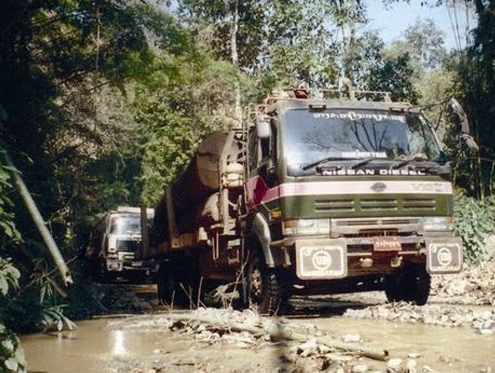Burma’s Ministry of Environmental Conservation and Forestry announced six months ago that a ban on the export of raw timber will go into effect on 1 April 2014. As that date nears, the Myanmar Timber Merchants Association (MTMA) has requested that foreign timber merchants cooperate with government policymakers to avoid the illegal export of timber.
“Transporting raw timber from one place to another in Burma is not allowed without permits from the Ministry of Forestry. But those are not required in China; the Chinese authorities do not ask to see these papers,” said Bar Bar Cho, secretary of MTMA. “As long as the tax is paid then it is all legal.”
Bar Bar Cho said that after a series of criticisms about deforestation in Burma by environmental organisations, the president held discussions with relevant government departments last year and ultimately came to a decision to prohibit the export of raw timber.
While the policy is welcomed by the MTMA and industry analysts, both have warned that there are several serious impediments to its success.
[related]
Bar Bar Cho said that not only must Burmese timber merchants cooperate, but those in neighboring countries must also comply by not purchasing the goods; while the sales are illegal in Burma they are legitimate by current regulations in some neighboring countries.
“Cutting down trees is prohibited in China, but not in Burma,” said Bar Bar Cho. “So the Chinese buy freely from Burma.”
“That must be stopped,” he continued, “If the Chinese authorities had acted responsibly by saying: ‘We won’t buy timber from Burma unless it has official documents from the [Burmese] Forest Ministry’, then it would have been different.”
Kevin Woods, a Rangoon-based analyst for the INGO Forest Trends, said that foreign demand is largely for raw timber – as opposed to value-added processed woods – because investors are not yet inclined to create processing plants in Burma’s underserviced and undeveloped areas. This creates a win-win situation for importers; they can buy cheap unfinished hardwoods from Burma and develop processing industries within their own borders. Woods contended that the ban could actually lead to an increase in illicit trade.
“The log export ban could indirectly increase pressure for cross-border trade in logs to get around Yangon [Rangoon] regulations,” said Woods.
Woods suggested that further reforms are necessary to create conducive conditions for the policy’s success, which would make forested areas better suited for development that benefits the country.
“Good land and forest governance is also needed in addition to the log export ban in order to achieve positive results,” he said.
Estimates vary, but most environmentalists agree that during British colonial times some 80 percent of the country was covered by forest, diving to 60 percent in the 1960s. However, once military rule prevailed and corruption became endemic, deforestation accelerated, leaving just 24 percent of the country forested as of 2008.
Bar Bar Cho noted that previous Burmese governments, especially under the military regime, relied heavily on exporting logs for foreign income. Some estimates say that 90 percent of all foreign currency at that time came from logging exports – some US$600 million per annum.
The illegal export of logs via the Burma-China land border alone is today valued at more than US$200 million per year.
However, in recent years, international organisations have suggested that environmental disasters are imminent in Burma due to its policy of mass deforestation.
“We must adhere to a policy of forest management to preserve our forests,” said Bar Bar Cho.
It has been estimated that in recent years 300,000 tons of teak and 2 million tons of hardwood are cut per annum in Burma. Starting from 2015, Burma is hoping to produce 60,000 tons of teak and 1.2 million tons of hardwood each year for the domestic market alone.



